Victories (and Setbacks) in the Big Fight for Fair Wages
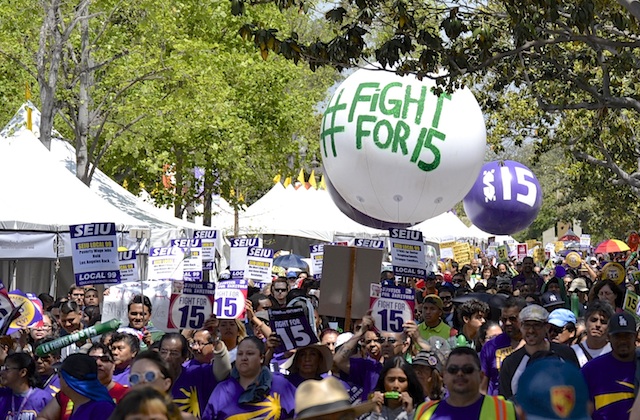
On April 15--Tax Day--thousands of low-wage workers gathered in Los Angeles to amplify the international call for a $15 minimum wage. The L.A. protest was one of many across the world in the SEIU-backed "Fight for $15" campaign. Sparked by the 2012 fast-food strikes in New York City, "Fight for $15" has helped intensify the national conversation about economic injustice and fair wages.
At times the L.A. protest resembled a low-wage workers' Olympics-style Parade of Nations, with laundry workers, janitors, adjunct faculty, students, fast food workers, home health care workers, all marching with their respective banners and color-coordinated T-shirts. Demonstrators marched a mile from a Los Angeles McDonald's restaurant on Figueroa and 28th to USC, where adjunct faculty joined with other retail and fast-food workers to demand better wages.
Wednesday's protest also came on the heels of some recent wins--and setbacks--for low-wage workers who've been organizing at some of the nation's largest corporations. Beginning July 1, McDonald's workers at corporate-owned restaurants will be paid $1 above the minimum wage, the fast-food giant announced in early April. The change will affect some 90,000 workers but still only benefit 5 percent of McDonald's workers, the Los Angeles Times reported. Five days later Domino's announced that it will follow suit and also raise wages at non-franchised restaurants as well, the New York Times reported.
In Los Angeles, workers in the city's largest hotels won a $15.37 minimum wage in September via a city ordinance. Wednesday's protest came just a day after hundreds of in-home care workers marched through Los Angeles demanding the same, and just weeks before another planned mobilization on May 1, International Workers' Day.
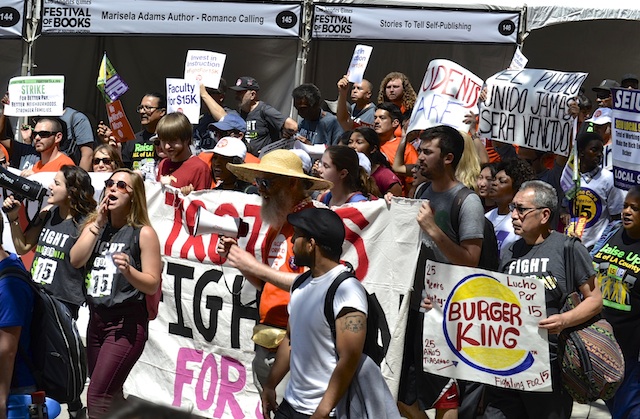
Meanwhile, Walmart recently announced plans to raise the floor on their wages. In February Walmart announced than 500,000 workers, about one-third of its workforce, will receive pay increases that are $1.75 more than the federal minimum wage. The increase will bring workers' base pay up to at least $9 an hour and is expected to come up to $10 an hour by 2016. Other major retailers like TJ Maxx, HomeGoods, and Marshalls, which are all owned by TJX, will be giving their workers a raise as well. In March, Target followed suit with a similar plan.
Major retailers have pitched their minimum-wage increases as a response to a tightening labor market in a time of economic resurgence. "Our goal is always to be competitive with the marketplace," Target spokesperson Dustee Jenkins told the Wall Street Journal last month.
But the wage increases have also come on the heels of high-profile sit-ins, walkouts, strikes and protests from workers at Walmart, McDonald's and other fast-food companies. "I do think that the modest concessions that Walmart and Target have offered are a reflection that worker organizing and public demands are winning," Kent Wong, director of the UCLA Labor Center told Colorlines.
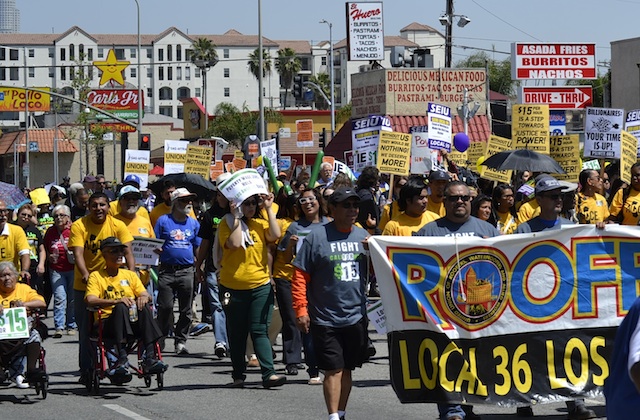
But they're not enough for some. In California, one of the most expensive states in the nation to live, and a state where at $9 the minimum wage is $1.75 higher than the federal minimum wage, the recent corporate announcements not only don't change much for low-wage workers, they're insufficient to meet the economic realities of life.
"I work for corporate so that's one of them that got $10 an hour," Fanny Velazquez, a nine-year employee at McDonald's, told Colorlines. Velazquez, a single mother raising three kids, was referring to the delineation between workers who got a raise at restaurants that are owned and managed directly by McDonald's and those at franchise-run restaurants that didn't. Her children joined her at Wednesday's march, and she said she decided to start protesting because even in her privileged position among McDonald's workers she still doesn't make enough money to pay for rent and all her other bills. "It's not fair--it's supposed to be for everyone. Franchise or corporate, we're working for the same employer," Velazqeuz said.
The recent concessions have been accompanied by other moves that could diffuse worker organizing efforts. On Monday, Walmart fired all 530 employees at a Los Angeles location on Pico Rivera due to plumbing issues, according to the company. Four other Walmart locations, including stores in Texas and Florida, were also shut down on Monday, CBS reported. The mass firing and immediate store closure caught workers by total surprise. "I was shocked," Jenny Mills, a nine-year employee at the Pico Rivera Walmart, told Colorlines. "We were given no warning at all."
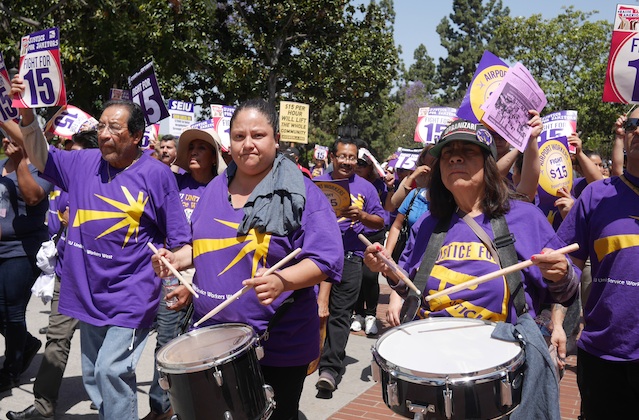
Walmart pledged workers 60 days' worth of pay and urged them to reapply to other store locations, but did not guarantee anyone a job, Mills said. Still, Mills, who works 40 hours a week and is living in her car in the store parking lot, says she's still confused. "I'm not making sense of it very well. I don't understand it."
Denise Barlage, who worked at the Pico Rivera Walmart for over eight years, said she received calls and texts from coworkers on Monday urging her to come in on her off day. "You need to understand, people were coming out of the store crying. It was total chaos. Women were falling to their knees in tears," Barlage told Colorlines.
The Pico Rivera location was also the site of some of the first Black Friday Walmart worker actions, which have since become an annual tradition. Back in 2012, it was Pico Rivera Walmart workers who were the first in the nation to walk off their jobs to protest low pay and work conditions. In 2014, 23 people were arrested for staging the first sit-in strike at the same location.
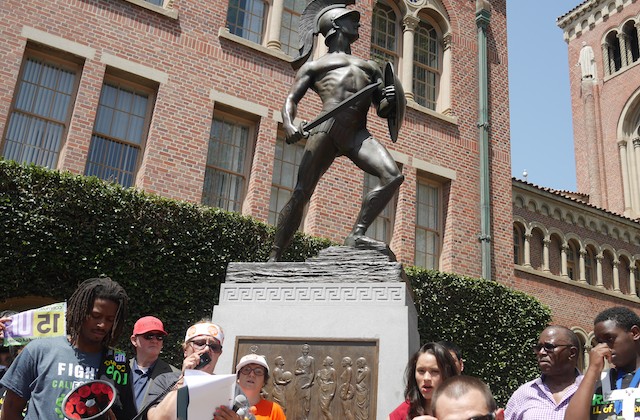
Barlage had been involved in worker talks to demand a higher wage since 2011, and said that at first, she was only very timidly involved. But over the years, as Walmart workers have won small changes, like access for more hours for associates, Barlage said she began to feel empowered. "It showed that when you get a group together and strive for a common good, you can win."
Now? "The store closeure puts a slight dent in our organizing, but we're moving on. They say it's a plumbing problem but we all know it's about something different, and we'll leave it there and keep moving."
In the meantime, Barlage says she's got to get down to applying for a new job.
Lead photo and first three photos by and published courtesy of Lauren McQuade.
